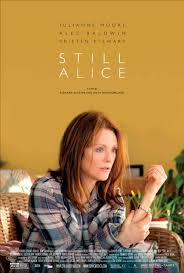I saw Still Alice last night. It was a very powerful, realistic story of a woman with early onset of Alzheimer’s, at age 50. And not just any woman. A woman who was extremely intelligent, and was a professor at Columbia. Her whole persona was painted by her linguist skills, of which she was very proud. Now, it would be taken away from her.
Obviously you can’t track the insidious path that Alzheimer’s takes in only two hours. However, I thought the film did a great job of showing just enough snippets of how her life changed as the disease progressed. Ironically, the disease progresses faster the more intelligent its victim.
Alice tries to plan for her future, but seems to be thwarted at every turn due to her increasing loss of memory. Her family, while supportive, each has their own lives to live. While I initially thought her husband was very supportive, upon further reflection I have decided he was very selfish. He did still love her, but he was very ambitious, as she had been, and he continued on his career path at the expense of spending time with his wife, going so far as to move away from her for a new job.
The children were an eclectic mix. There was a very self-centered over-achiever older daughter, a busy doctor son, and a starving actress youngest daughter living across the country.
The ending will surprise you, in several ways. One in the way in which the actual movie ends, and secondly in what happens to Alice. I do not want to spoil it for any future movie watchers, so we will leave it at that.
I was initially conflicted about seeing this movie. My own mother died from Alzheimer’s at the age of 75. Her sister currently has it. Looking back, I can see her decline over about 10 years. To me, she seemed to change the most after knee replacement surgery. When she woke up from anesthesia, she was VERY disoriented and confused. She really had no idea what was going on for several months. She did get better, but she was never the same. I firmly blame the anesthesia, for uncovering or bringing on her Alzheimer’s. Many scientific/medical journals have debated this question for years. Anesthesia has been linked to cognitive problems, and also postoperative delirium, that can last from days to years.
I can say this, because I am living proof. My mother had multiple medical problems and had many surgeries in her life. I am her clone, and unfortunately have followed her same path in many ways. I too have had many surgeries in my life. Recently, the past two years, I have had 9 surgical procedures in regards to my hip. Which each one, I felt my brain getting fuzzier and fuzzier. I grasp at words sometimes. I forget names. I just don’t feel like I am as “smart” as I used to be.
Could it be coincidence? Sure. I am getting older, every year. But I do think it has affected me to some degree. I am so sure of it that I refused to have general anesthesia, and opted for a local for my last hip aspiration. Did it hurt? Yes. Am I glad it hurt? Yes. At least I knew my brain was still functioning.
Do I worry about Alzheimer’s? Yes. Every day. The stats are staggering. I have a lot of factors against me. I wish they would SOMETHING to help with this disease. The Baby Boomers are a huge segment of population that tends to gets things done. Elderly care has become a main issue because of their demands. Many are of the Alzheimer’s age now. I pray that the sheer number will spur more research and development of better drugs, or find a cure.
I still have guilt about my mom. I should have been there for her more. I tried. I really did. I worked full time, and there were many times I had to jump in my car and drive to her senior living apartment because she didn’t answer the phone. Most times it was because she didn’t hang up right. Then I found her on the floor. Twice. That was enough. Her doctor recommended a nursing home, as she required 24/7 monitoring. I knew she would hate it. I remember checking her in, and in a moment of clarity, she looked right at me with her cloudy blue eyes and said, is this what my life has come to? I cried all the way home, and for many days after that. She did acclimate, and at least had more social interaction there than alone in her apartment, but I still felt guilt every time I went to visit her. As the disease progressed, she didn’t know there was anything wrong with her, and I actually felt grateful for that. I would like to think she died peacefully. She did remember my name every time I saw her, and was always happy to see me. She thought my dad, who had died more than 20 years previously, was there in the room with her, as a Scottie dog sitting in the corner. I always said hi to him too. I may have petted him on the way out. It gave me comfort to think that my dad was watching over her.
Anyway, Still Alice is a GREAT movie, Julianna Moore gave an absolutely wonderful performance, and I am glad I saw it, despite my earlier conflict about it. 5 stars all the way.
Do you have any experience with Alzheimer’s? Have you seen the movie? I would love to hear your comments.

